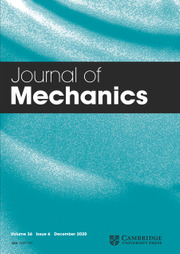Crossref Citations
This article has been cited by the following publications. This list is generated based on data provided by
Crossref.
Ge, Zheng-Ming
and
Tsen, Pu-Chien
2008.
Chaos synchronization by variable strength linear coupling and Lyapunov function derivative in series form.
Nonlinear Analysis: Theory, Methods & Applications,
Vol. 69,
Issue. 12,
p.
4604.
Ge, Zheng‐Ming
Ho, Chun‐Yen
Li, Shih‐Yu
and
Chang, Ching‐Ming
2009.
Chaos control of new Ikeda–Lorenz systems by GYC partial region stability theory.
Mathematical Methods in the Applied Sciences,
Vol. 32,
Issue. 12,
p.
1564.
Ge, Zheng-Ming
and
Li, Shih-Yu
2009.
Chaos control of new Mathieu–Van der Pol systems with new Mathieu–Duffing systems as functional system by GYC partial region stability theory.
Nonlinear Analysis: Theory, Methods & Applications,
Vol. 71,
Issue. 9,
p.
4047.
Li, Shih-Yu
and
Ge, Zheng-Ming
2011.
Pragmatical adaptive synchronization of different orders chaotic systems with all uncertain parameters via nonlinear control.
Nonlinear Dynamics,
Vol. 64,
Issue. 1-2,
p.
77.
Yang, Cheng-Hsiung
Chen, Tsung-Wen
Li, Shih-Yu
Chang, Ching-Ming
and
Ge, Zheng-Ming
2012.
Chaos generalized synchronization of an inertial tachometer with new Mathieu-Van der Pol systems as functional system by GYC partial region stability theory.
Communications in Nonlinear Science and Numerical Simulation,
Vol. 17,
Issue. 3,
p.
1355.
Li, Shih-Yu
Yang, Cheng-Hsiung
Chen, Shi-An
Ko, Li-Wei
and
Lin, Chin-Teng
2013.
Fuzzy adaptive synchronization of time-reversed chaotic systems via a new adaptive control strategy.
Information Sciences,
Vol. 222,
Issue. ,
p.
486.
Li, Shih-Yu
Yang, Cheng-Hsiung
Ko, Li-Wei
Lin, Chin-Teng
and
Ge, Zheng-Ming
2013.
Implementation on Electronic Circuits and RTR Pragmatical Adaptive Synchronization: Time-Reversed Uncertain Dynamical Systems' Analysis and Applications.
Abstract and Applied Analysis,
Vol. 2013,
Issue. ,
p.
1.
Chen, Chin-Sheng
Tsai, Shun-Hung
Tam, Lap-Mou
and
Li, Shih-Yu
2017.
Fuzzy adaptive control of two totally different chaotic systems with complicated structures by novel pragmatically adaptive control strategy.
Soft Computing,
Vol. 21,
Issue. 22,
p.
6783.
Li, Shih-Yu
Chen, Chin-Sheng
Tam, Lap-Mou
and
Tsai, Shun-Hung
2017.
Novel Fuzzy-Modeling-Based Adaptive Synchronization of Nonlinear Dynamic Systems.
Complexity,
Vol. 2017,
Issue. ,
p.
1.
Tam, Lap-Mou
Chen, Hsien-Keng
and
Li, Shih-Yu
2018.
Adaptive synchronization of complicated chaotic systems with uncertainties via fuzzy modeling-based control strategy.
Information Sciences,
Vol. 427,
Issue. ,
p.
18.
Li, Shih-Yu
Tsai, Shun-Hung
Chen, Chin-Sheng
and
Tam, Lap-Mou
2022.
Adaptive Control of Advanced G-L Fuzzy Systems with Several Uncertain Terms in Membership-Matrices.
Processes,
Vol. 10,
Issue. 5,
p.
1043.
Yan, Shaohui
Lu, Rong
and
Zhang, Hanbing
2025.
Dynamical behaviors of the simple chaotic system with coexisting attractors and its synchronous application.
Integration,
Vol. 102,
Issue. ,
p.
102368.


